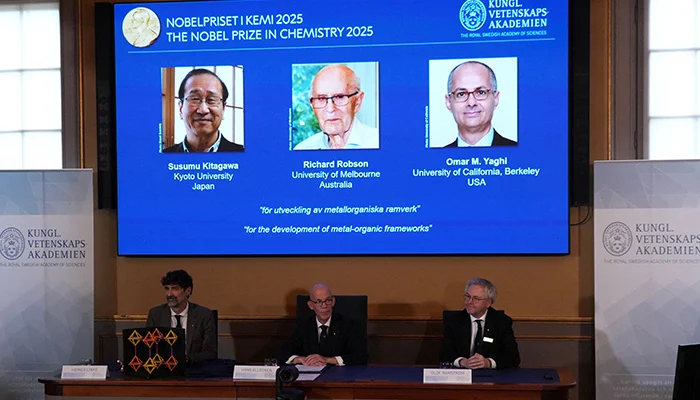Select Language:
Scientists Susumu Kitagawa, Richard Robson, and Omar Yaghi received the 2025 Nobel Prize in Chemistry for pioneering a new type of molecular structure that produces materials capable of addressing major global issues like climate change and freshwater scarcity.
Their work focused on creating metal-organic frameworks (MOFs), structures with vast internal spaces that allow gases and chemicals to move freely. These frameworks can be used to extract water from desert air, trap carbon dioxide, or contain hazardous gases.
Describing these materials’ “unprecedented properties,” the Nobel committee highlighted their enormous surface areas—imagine a tiny sugar cube with enough surface area to cover a football field. Olof Ramström, a member of the Nobel Chemistry Committee, explained, “A small amount of this material can store nearly as much gas as Hermione’s bag in Harry Potter, all in a tiny volume.”
Potential applications include tackling “forever chemicals” — persistent pollutants that are difficult to remove from water. The Nobel prize, which has been awarded by the Royal Swedish Academy of Sciences for over a century, includes a prize purse of 11 million Swedish crowns (roughly $1.2 million) and global recognition.
Kitagawa expressed his deep honor at receiving the award, sharing his vision of capturing and converting air into useful substances like oxygen or water, powered by renewable energy. Yaghi emphasized the role of science in societal benefit, citing how MOFs are already being used in cement plants to reduce emissions—since cement production accounts for about 7% of worldwide CO₂ emissions.
Since their discovery, scientists have developed tens of thousands of different MOFs, many of which could help solve some of humanity’s toughest challenges, including removing toxic chemicals from water and degrading pharmaceutical residues in the environment.
Prof. Kitagawa is based at Kyoto University in Japan, Robson at the University of Melbourne in Australia, and Yaghi at UC Berkeley in the U.S. Kitagawa is Japanese, Robson was born in Britain before moving to Australia, and Yaghi is Jordanian-American. Yaghi, born to Palestinian refugees in Jordan, grew up sharing a small home with livestock. He reflected on how science has empowered him to overcome such humble beginnings, calling it “the greatest equalizing force in the world.”
Yaghi, who was stunned and pleased to win, recalls discovering a chemistry book at age ten that sparked his lifelong passion. He added, “The deeper you explore, the more beautifully things are constructed.” Robson, who received the news shortly before the official announcement, spent a quiet celebration at home outside Melbourne, joking about breaking his health vow by having a cheap glass of wine.
Following the chemistry prize, the Nobel awards continue with the literature announcement scheduled for Thursday. Since 1901, Nobel Prizes have recognized groundbreaking achievements in science, literature, and peace, often overshadowed by the more prominent physics laureates. Notably, the chemistry award has previously honored discoveries such as nuclear fission, DNA analysis techniques, and yeast research. Last year’s chemistry laureates from the US and UK made strides in understanding and engineering protein structures for medical advances.







